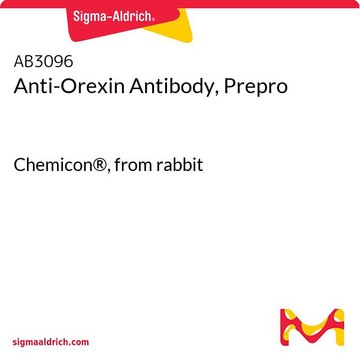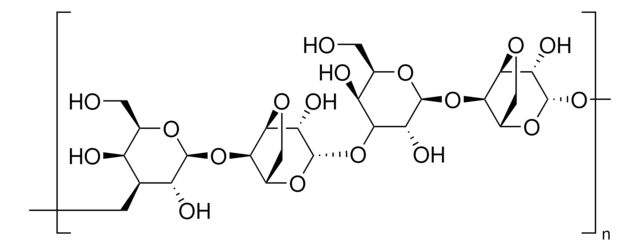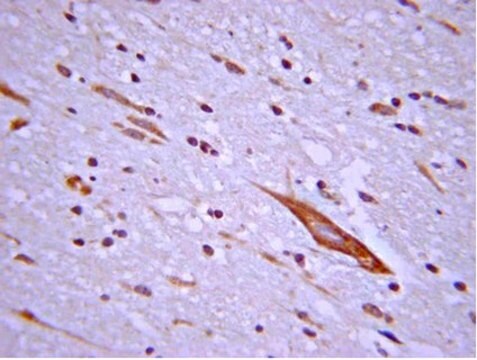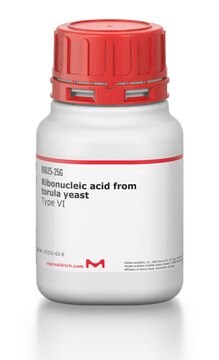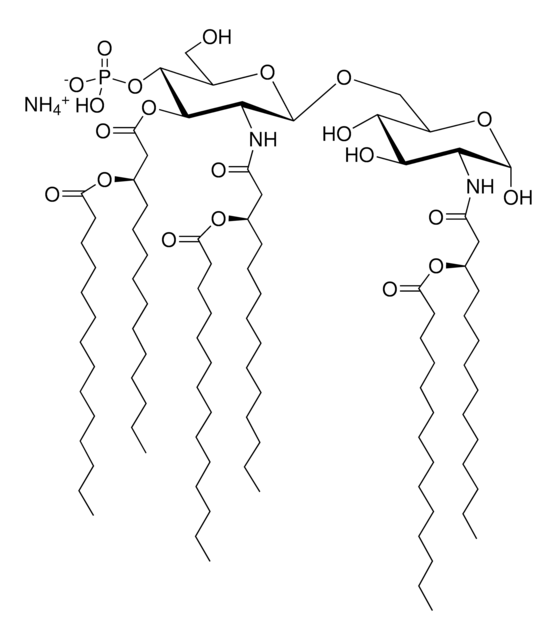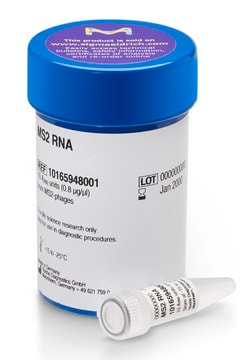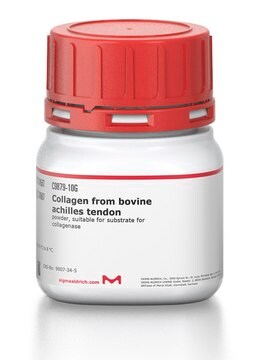AB4073
Anti-Farnesyl Antibody
Chemicon®, from rabbit
Zaloguj sięWyświetlanie cen organizacyjnych i kontraktowych
About This Item
Kod UNSPSC:
12352203
eCl@ss:
32160702
NACRES:
NA.41
Polecane produkty
pochodzenie biologiczne
rabbit
Poziom jakości
forma przeciwciała
purified immunoglobulin
rodzaj przeciwciała
primary antibodies
klon
polyclonal
reaktywność gatunkowa (przewidywana na podstawie homologii)
all
producent / nazwa handlowa
Chemicon®
metody
ELISA: suitable
immunofluorescence: suitable
Warunki transportu
wet ice
docelowa modyfikacja potranslacyjna
unmodified
Opis ogólny
Protein isoprenylation is a post-translational modification that affects about 0.5% of cellular proteins and is essential for the biological activity of proteins. Two enzymes catalyze theattachment of two prenyl groups to the sulfhydryl group of carboxyl-terminal cysteine groups. Proteins which are prenylated by these enzymes have a distinct motif at the C-terminal of the protein, C-A1-A2-X (C = Cysteine, A 1 & A2 = aliphatic amino acids). The two enzymes involved in this transfer are farnesyltransferase and geranylgeranyltransferase. These transfer a 15 carbon farnesyl or a 20 carbon geranygeranyl, respectively, from aprenyl-pyrophosphate to the protein. Examples of proteins containing this C-A-A-X motif are members of the Ras small G protein family, the nuclear lamins and the gamma subunit oftrimeric G proteins. Prenylation of proteins is necessary for membrane association of proteins as well as protein-protein interactions and the nature of the linked isoprenyl group can influence the protein interactions, such as the interaction between G proteins and receptors.
Specyficzność
Recognizes farnesyl motif derived from isoprenylated C-A-A-X sequence. Also cross-reacts with geranylgeranyl motif. Detects KLH as well.
Immunogen
Antibody developed using farnesyl cysteine conjugated to KLH.
Zastosowanie
Anti-Farnesyl Antibody detects level of Farnesyl & has been published & validated for use in ELISA & IF.
ELISA
Immunofluoresecence
Optimal working dilutions must be determined by end user.
Immunofluoresecence
Optimal working dilutions must be determined by end user.
Research Category
Signaling
Signaling
Research Sub Category
MAP Kinases
MAP Kinases
Postać fizyczna
Format: Purified
Purified immunoglobulin. Sterile liquid in phosphate buffered saline and 0.08% sodium azide.
Przechowywanie i stabilność
Maintain at -20°C in undiluted aliquots for up to 12 months from date of receipt. Avoid repeated freeze/thaw cycles.
Inne uwagi
Concentration: Please refer to the Certificate of Analysis for the lot-specific concentration.
Informacje prawne
CHEMICON is a registered trademark of Merck KGaA, Darmstadt, Germany
Oświadczenie o zrzeczeniu się odpowiedzialności
Unless otherwise stated in our catalog or other company documentation accompanying the product(s), our products are intended for research use only and are not to be used for any other purpose, which includes but is not limited to, unauthorized commercial uses, in vitro diagnostic uses, ex vivo or in vivo therapeutic uses or any type of consumption or application to humans or animals.
Ta strona może zawierać tekst przetłumaczony maszynowo.
Nie możesz znaleźć właściwego produktu?
Wypróbuj nasz Narzędzie selektora produktów.
Kod klasy składowania
12 - Non Combustible Liquids
Klasa zagrożenia wodnego (WGK)
WGK 2
Temperatura zapłonu (°F)
Not applicable
Temperatura zapłonu (°C)
Not applicable
Certyfikaty analizy (CoA)
Poszukaj Certyfikaty analizy (CoA), wpisując numer partii/serii produktów. Numery serii i partii można znaleźć na etykiecie produktu po słowach „seria” lub „partia”.
Masz już ten produkt?
Dokumenty związane z niedawno zakupionymi produktami zostały zamieszczone w Bibliotece dokumentów.
R Baron et al.
Proceedings of the National Academy of Sciences of the United States of America, 97(21), 11626-11631 (2000-10-12)
Protein isoprenylation is a lipid posttranslational modification required for the function of many proteins that share a carboxyl-terminal CAAX motif. The X residue determines which isoprenoid will be added to the cysteine. When X is a methionine or serine, the
Zurab Siprashvili et al.
Nature genetics, 48(1), 53-58 (2015-11-26)
Small nucleolar RNAs (snoRNAs) are conserved noncoding RNAs best studied as ribonucleoprotein (RNP) guides in RNA modification. To explore their role in cancer, we compared 5,473 tumor-normal genome pairs to identify snoRNAs with frequent copy number loss. The SNORD50A-SNORD50B snoRNA
Isoprenylation of polypeptides in the nematode Caenorhabditis elegans.
Aspbury, R A, et al.
Biochimica et Biophysica Acta, 1392, 265-275 (1998)
Fei Liu et al.
Human molecular genetics, 24(16), 4648-4659 (2015-06-03)
Retinitis pigmentosa (RP) affects about 1.8 million individuals worldwide. X-linked retinitis pigmentosa (XLRP) is one of the most severe forms of RP. Nearly 85% of XLRP cases are caused by mutations in the X-linked retinitis pigmentosa 2 (RP2) and RPGR.
Wen Yang et al.
The Journal of pharmacology and experimental therapeutics, 339(3), 832-841 (2011-08-30)
Treatment with statins, inhibitors of HMG-CoA reductase, extends the survival of septic mice. However, the molecular mechanisms underlying the cholesterol-lowering, independent beneficial effects of statins in sepsis are poorly understood. The inhibition of protein isoprenylation, namely farnesylation and geranylgeranylation, has
Nasz zespół naukowców ma doświadczenie we wszystkich obszarach badań, w tym w naukach przyrodniczych, materiałoznawstwie, syntezie chemicznej, chromatografii, analityce i wielu innych dziedzinach.
Skontaktuj się z zespołem ds. pomocy technicznej